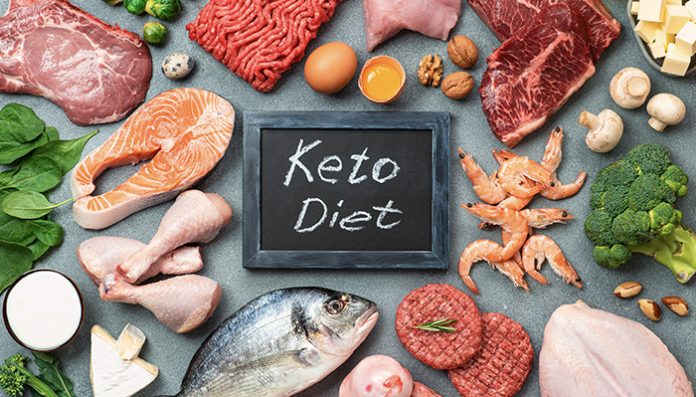
The ketosis diet is all the rage, but do people really understand its effects on the body?
By Ken Melissa
The “keto” in the ketogenic diet is short for ketone, a tiny fuel molecule produced by the body as an alternative fuel when the supply of blood glucose is inadequate.
Ketones are generated when you eat very few carbohydrates (which are promptly broken down into blood glucose), and only moderate quantities of protein (excess protein can also be converted to blood glucose).
The liver converts fat into ketones that are used as fuel by the brain and throughout the body. The brain is never satisfied – it consumes a lot of energy every day, which means it can’t run on fat directly, only glucose or ketones.
When our body produces ketones, it’s assumed to be in ketosis. Although fasting is the quickest way to get there, no-one can go forever without eating.
The keto diet approach appears to work for many as a weight-loss solution. There are even some clear-cut benefits of which you might not be aware. But there are also some serious drawbacks to putting your body in ketosis.
Pros of going keto:
When your body is in ketosis, it processes fat and uses it as fuel in a way that no other state easily allows. Carbohydrates are much easier to break down and use as fuel, so when you are providing lots of ketones to your body, you must burn and use all carbs before your body begins converting fat into a source of fuel.
Excess ketones are in and of themselves not dangerous to your system in any way. Any ketones you produce that aren’t required by your body are eliminated through urine, easily and harmlessly. In fact, this excellent benefit allows you to confirm that you are in a state of ketosis using urine testing strips in the morning.
When your body is used to being in ketosis, it will start to prefer ketones to glucose. This is the perfect state that you desire your body to be in; no more sugar cravings whatsoever, and in fact, your body will start having a preference for protein as fuel as opposed to glucose.
Being in a ketogenic state is very helpful for controlling insulin levels in the body. Insulin is one of the factors that make you crave food, so controlling it to healthy levels can be a key component of weight loss.
“There are benefits to a ketosis diet, but we only like to recommend restrictive diets for medical necessities,” said Jenni Bourque and Mirna Sharafeddine, registered holistic nutritionists and the founders of Naughty Nutrition.
“Keto has shown successful for obesity, and those with neurological issues, such as Parkinson’s, Epilepsy, or Alzheimer’s, but the research and efficacy for any other conditions is very limited,” says Bourque.
“Keto may also be beneficial for those with diabetes and need to manage their blood sugar levels, but only with guidance from a medical professional.”
The majority of people who take an interest in ketogenic diet weight loss claim that being in a ketogenic state makes them feel significantly less famished than when they are in a non-ketogenic state. It is much easier to stick to a diet – any diet – when you’re not fighting cravings and hunger every step of the way. In fact, hunger pangs can often derail a person’s best efforts, and not having to deal with them makes it easier to meet your goals, all the way around.
Keto has shown successful for obesity, and those with neurological issues, such as Parkinsons, Epilepsy, or Alzheimers, but the research and efficacy for any other conditions are very limited.
“We do know people who have had serious weight issues affecting their day today, and they have lost the weight on keto and maintained the weight loss,” says Sharafeddine.
“We also know many (and the majority) that have been unsuccessful and would return to their habits after the diet is stopped.”
Cons of going keto:
The state of carbohydrate deprivation is not only unhealthy however is viewed by your body as a crisis. This is quite adequate to make me ban this diet for life. But if that’s not enough to inspire caution around the keto diet, there are plenty of other negative side effects.
“If you have a negative body perception, or fear certain foods, the restrictions with the keto diet can fuel those thoughts,” says Bourque.
“The mainstream thought behind keto really emphasizes carbs being the enemy, which just isn’t the case from a biological standpoint. If you go through keto, lose weight and feel amazing, the idea of carbs = bad may always linger in the back of your mind and can contribute to the negative food associations.”
Other primary side effects of a ketosis diet are persistent tiredness and generalized fatigue and similar bodily malfunctions precipitated by not having enough glucose in your body. On top of that, it can also cause life-threatening liver damage and the destruction of muscle tissue (muscle atrophy). I’m sure you don’t want any of those. But that isn’t all.
“We don’t have enough studies on the long-term effects of the ketogenic diet but we have enough information to understand that a diet that is high in saturated fat (from animal sources), as well as protein, can be hard on the body especially on the heart, kidneys, and liver,” says Sharafeddine.
“Depending on the foods the person is consumed by following a keto diet, if there is a lot of focus on processed meats, it may also increase the risk of colon cancer and lead to nutritional deficiencies. The most common short-term side effects are fatigue, headache, brain fog, and digestive issues or constipation/diarrhea.”
Although extremely rare, ketoacidosis a serious condition that can be fatal has been observed in several pregnant women on a very low-carb diet, Sharafeddine adds.
Considering that one of the effects of a ketosis diet is persistent fatigue, it’s very likely that you won’t be able to follow even the easiest workout regimen. And as we all know, working out is a vital part of losing weight. So you are constantly tired, you can’t exercise because you don’t have sufficient energy, you have a lot of constraints regarding what you can and can’t eat, and your body uses its fat as a last-resort energy source.
“The keto diet shouldn’t be a DIY diet – you are either in a state of ketosis or you’re not, but when you flip flop in and out of ketosis you run the risk of experiencing more of the negative side effects as well as getting into a yo-yo diet cycle,” says Bourque.
“Both of us have a history of habitual diet cycling and negative body images, so something as restrictive as a keto diet is not something we would try as it may be a trigger those negative body perceptions,” adds Sharafeddine.
“Our personal food philosophy comes from a place of balance – you can have some sugar in your diet but portion control and craving management will be much more successful long-term.”
“That being said, we do know people who have had serious weight issues affecting their day today, and they have lost the weight on keto and maintained the weight loss. We also know many (and the majority) that have been unsuccessful and would return to their habits after the diet is stopped.”
The trick for success is to wean someone off of keto into a healthy, whole-food-based diet that doesn’t focus on carbs as being the enemy, but rather something that’s necessary for survival, they say, with a post-keto diet being one that has balance and wiggle room.
“The keto diet can definitely be successful for those who really need to be on it, but if you are just trying to lose weight and get healthier, there are plenty of other ways to do that (and feel the same as on keto) without the restrictions.”
According to the Naughty Nutritionists, the best diet for most people is one filled with fresh, whole foods with an emphasis on plants, low in added sugars, processed food, rancid oils or vegetable oils cooked at high heat, and with a balanced amount of dairy and animal protein.
“We find the most success comes from diets that can be sustained long term,” says Borque.
“We also know that individual needs vary so there is never one diet that fits all. Working with a nutrition expert to gain more insight into your own individual needs may be the best diet for you. Nutrition experts can help assess your symptoms and build an exact diet plan for what you need.”
In the end, it will be up to you and your doctor to decide if a keto diet’s the right path for you, especially if you would like to stay on it for an extended period of time. Keto diets are really only encouraged to use by doctors when patients are suffering from obesity or in need of specific surgeries. The key takeaway here is: consult your doctor when making this decision.
Some links to medical studies on the effects of ketosis and the keto diet:
The ketogenic diet: a 3- to 6-year follow-up of 150 children enrolled prospectively
Ketosis and appetite-mediating nutrients and hormones after weight loss
Anticonvulsant and neuroprotective effects of the ketogenic diet
Nephrolithiasis associated with the ketogenic diet
Risk factors for urolithiasis in children on the ketogenic diet
Effects of Ketogenic Diets on Cardiovascular Risk Factors: Evidence from Animal and Human Studies
Ketoacidosis associated with low-carbohydrate diet in a non-diabetic lactating woman: a case report








